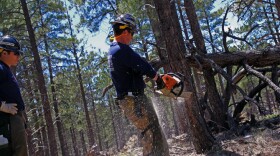One of public radio's most popular shows is coming to Flagstaff. The cast of A Prairie Home Companion will perform a live national broadcast tomorrow from the amphitheater at Fort Tuthill County Park. Arizona Public Radio's Gillian Ferris had a chance to talk with the show's host, Garrison Keillor. He's on the road, making his way from Minnesota to Flagstaff, and celebrating 40 years with A Prairie Home Companion.
GF: You're coming to Flagstaff on the heels of a big forest fire in one of the most beautiful and beloved canyons in northern Arizona. With as much traveling as you do with the show, I'm sure this isn't the first time you've shown up to a place just following - or during - some type of calamity. How do you and the Prairie Home Companion crew weave those events into your show? What kinds of discussions do you have about what to say, or what to steer clear or?
GK: Well, the show is kind of a light hearted, cheerful show. And so, we don't get into calamities really. Sometimes you have to avoid mentioning things because people's feelings are tender. But, you know, we're not a hard driving program of journalism. We're meant to give people a break. So we just come in, and take a deep breath, and smell the pines, and be in that beautiful place. I remember it very well from the last time we were there. It's one of the few places we've ever done a show where you can inhale the gorgeous vegetation. I'm trying to write a little song about Flagstaff. I want to look up a railroad song from the 19th century, or if I can't find one, I'll write one. I can write 19th century songs as well as anybody else. I wrote a song about the planet Pluto in honor of the Lowell Observatory. So, we'll talk about all these odds and ends and not try to tread on thin ice.
GF: On the subject of songs...you may or may not be aware of this, but it's Smokey Bear's 70th birthday this summer. And there is a Smokey The Bear song. Do you know this song?
GK: I was hoping you'd sing it for me.
GF: Oh, dear. Here goes my radio career. It's something like, "Smokey the Bear. Smokey the bear. A'prowlin' and a'growlin' and a'sniffin the air". I don't suppose there's any chance that song might make it in the show?
GK: No. That's not going to make it in the show (laughs). We'll leave Smokey to the Forest Service.
GF: So, the show celebrates 40 years this summer. And your desire to do this show came from an article you wrote in 1974 for The New Yorker about the Grand Ole Opry. Could you tell us that story? How that article was the impetus for you wanting to do a traveling radio show?
GK: Well, I just stood around backstage at the Ryman Auditorium in Nashville, and I watched all of those good people - they're all gone now - Porter Wagoner, Minnie Pearl, Roy Acuff. Dolly Parton was there, she's still around. And they just seemed to be having a great time. They were all dressed up in gaudy clothes, and the audience loved them, and I stood off in the wings - me, the objective reporter. And I thought a person could do this, you know? I had friends who were musicians, still do. And, I could put together a live radio variety show like this. And so I went back, and I did. It was back in the early primative days of public radio when all sorts of foolish projects got started. Now, they have a lot of management, and vice presidents, and project managers to prevent these things from happening. But, back then in the wild days a person was able to take a simple, naive idea and bring it to fruition.
GF: Do you think that this kind of traveling, live-radio, vaudevillian show is threatened now with the way media is, with all the quickness, and social media - Twitter and Facebook. It moves so fast. Do you think about the future of A Prairie Home Companion in that regard?
GK: I think we live in a different sphere. There are statistics, surely, that people cite that say that tuning in to a show at a particular time is fading rapidly and that we live in an age of podcasts. I enjoy podcasts, but nonetheless, there still are people who want to do this. It's a big country and there's a place for everybody. And, I think as long as the show continues to be fresh and enthusiastic and upbeat, I think there will be people who want to tune in on a particular time on Saturday and listen to it. Maybe our audience will gradually reduce to incarcerated felons and people in rehab centers. But, nonetheless, there still will be an audience.
GF: You've spent so much time imagining and inventing Lake Wobegon, the backdrop for the show. Do you ever blur the lines between reality and Lake Wobegon? Are they the same thing for you? Do you wish sometimes that you could escape to that idyllic place?
GK: I don't. I don't see it as idyllic. I also don't feel that I have a good grip on it, and that's one reason to keep on doing the show for a few more years is the thought that I can do better with this. I haven't really grasped it.
GF: That's a surprising answer that you feel like you don't have a grasp on it after so many years.
GK: I don't. I don't. I really don't. I need to get serious about this after 40 years (laughs). You know? I'm just starting to get the hang of this.






